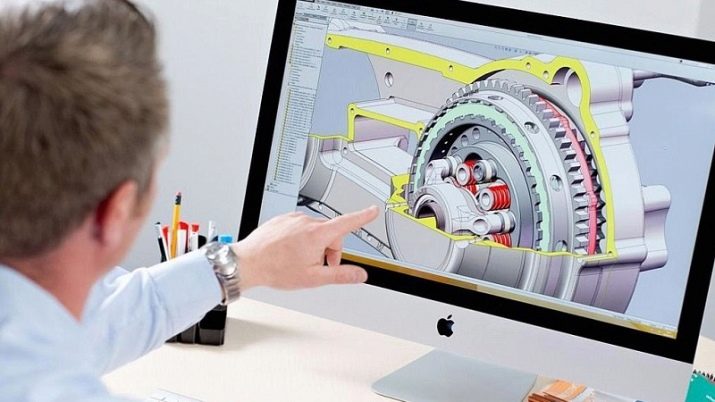All about the profession of design engineer

Design engineer is a very difficult profession, but very interesting... For several hundred years, specialists in this field have been engaged in the development and design of buildings, various structures and many other benefits of civilization. It is enough to go outside and look around to see how small towns and large cities are being transformed with their help. Houses are growing, communication is increasing, roads are changing. And this is only a small part of what the specialists of this profession do.
Peculiarities
According to historical information, the very first designers appeared in Ancient Egypt. Scientific researchers have managed to find a lot of evidence for this fact. For example, the Egyptian plumbing. While studying it, modern technicians were surprised how perfect the system turned out to be.
The list of outstanding discoveries of the Renaissance also includes the diaries of Leonardo da Vinci, in which detailed descriptions and drawings of various technical devices were found. After some time, people were able to translate some of his ideas into reality.

Today the profession of design engineer is the most demanded one. Specialists in this field meet in different fields, but their association most often occurs with architects. Among employers looking for a highly qualified designer in their staff, draftsmen, plans of buildings, various structures and utilities are in great demand.
The areas of this specialty include not only the developers of communication projects. They also include developers of construction projects, highways, HVAC (heating, ventilation and air conditioning), ACS (automated control system).
The characterization of the profession includes important advantages.
- Demand... In the labor market, the profession of a designer is popular. Especially if they are highly qualified specialists who have shown themselves more than once in the professional field.
- Wage... Even a novice design engineer gets a decent salary. There is nothing surprising. On his shoulders lies design, development, verification. But most importantly, he bears enormous responsibility for his work. And this applies not only to administrative, but also to criminal legislation.
- Workplaces... There is no need for a design engineer to constantly visit construction sites and monitor the work process as a technical supervision. Yes, you have to do trips, but most of the working time is spent in the office at the computer in a relaxed atmosphere.

Despite such significant advantages of this profession, there are some disadvantages.
- Routine. The designer, day after day, until the object taken into work is finished, has to work out all its nuances. Check in detail every millimeter of the plan.
- Records management... Every day, the design engineer must fill out a huge number of working documents, which must be signed by the management and the customer.
Often, managers try to exploit the designer by assigning tasks that do not correspond to his job responsibilities. To prevent this from happening, a specialist must know ECTS - a unified qualification reference book for the positions of managers, specialists and other employees. It displays the professional standard of the position, provides a detailed description of the profession, presents the job responsibilities of a leading specialist and design engineer of 1, 2 or 3 categories.
The main thing in the profession of a design engineer is the precise fulfillment of the assigned tasks. A specialist who is unable to cope with working moments in a timely manner should change his profession.

Responsibilities
A complete list of the responsibilities of a design engineer can be found in the job description that is attached to the employment contract. It specifies specifically what the main and secondary tasks should be performed by the specialist. What functions are entrusted to his shoulders.
- Collection of data regarding the object taken into work. Analysis and evaluation of the information found. Checking the technical specifics.
- Development and design of a general plan or individual parts of the project according to the parameters provided.
- Reconstruction or renovation works in already operated facilities. Implementation of functional changes in finished projects.
- Development of structural plans residential and industrial premises, as well as infrastructure elements.
- Drawing up reports and maintenance of technical documentation. Their subsequent verification. If necessary, the design engineer is engaged in the coordination of some of the nuances with support services.
- Conducting a thorough check compliance with safety standards.
- Discussion with the customer of the nuances of the project, as well as obtaining consent in the form of a signature on documents from customers, executors and regulatory authorities.
- Implementation of innovative technologies in the design process.
- Conducting data evaluations in terms of technology and economic component.
- Close control over the implementation of ideas and corrections made to the developed drawings. Subsequent evaluation of the finished result.
However, the responsibilities of a design engineer may differ slightly from organization to organization.In this case, we are talking about additional reporting and the ability to replace another employee in case of force majeure.


Knowledge and skills
Any company that hires a design engineer will consider applicants with only a college degree. It is very difficult to deceive the leader in this matter. Even during the interview, when the applicant is asked questions regarding professional knowledge, it will become clear how competent the candidate is. When considering applicants, special attention is paid to professional skills. A highly qualified specialist must have deep knowledge in the field of technologies and organizational aspects of production. He is required to possess mathematical, economic and analytical knowledge.
The design engineer must know the rules of business etiquette to support the conversation and negotiate with customers. To be able to find a common language with them and select a key to them. The designer must have the skills to maintain working documentation. Know the rules for drawing up acts, various statements, estimates. Be able to design effective funding schedules. A highly qualified specialist must be able to quickly resolve technical issues. Understand project documentation. To be able to draw up acts of violations committed in the course of work. The design engineer must know regulatory documents and GOSTs.
An excellent knowledge of a computer is required from modern designers, since all the work is enclosed in special programs. Also, the specialist must have knowledge of the English language, because most of the documentation for the reconstructed and constructed objects is made in a foreign language. Also, a design engineer must immediately react to non-standard situations, be able to make quick and correct decisions. He is obliged to be present at interviews with candidates who will work under his supervision.
But most importantly, the design engineer must understand the psychological states of his subordinates.


Personal qualities
In addition to professional skills, a design engineer must have a number of personal qualities that will help him in fruitful work. And this is not surprising, because engineers have more than a dozen people under their command. Accordingly, he must be able to work in a team, manage the team correctly and put the work on stream in order to avoid force majeure situations. However, the ability to find a common language with people and have managerial skills - only part of the personal qualities that a designer engineer must possess.
- Discipline... Based only on personal example, you can demand discipline from your subordinates.
- Attentiveness. In this case, the issue concerns the maintenance of working documentation, drawing up estimates, plans and drawings.
- A responsibility. A highly qualified design engineer is responsible for his work not only on paper, but also by law.
- Result orientation... This characteristic suggests that the specialist achieves the set goal on time.
- High learning ability. With these words, the engineer informs that at any moment he is ready to undergo retraining or improve his qualifications.
- Excellent memory.
- Positive attitude towards exact sciences.
- Equilibrium. It is this personal characteristic that suggests that the specialist is able to smooth out the rough edges in working with the customer, subordinates and immediate supervisor.

A responsibility
In the job description of each technician there is a point "responsibility".
- The design engineer is responsible for non-fulfillment or improper fulfillment of official duties... In such a situation, the specialist receives a punishment in accordance with the employment contract and legislation.
- For legal violations committed in the course of labor activity, design engineer can incur administrative, criminal or civil liability.
- Also design engineer bears responsibility for material damage criminal or civil law.
- A specialist in such a significant profession responsible for disclosing the company's trade secrets or the enterprise where he works or worked previously.

Education
Becoming a design engineer is easy. The main thing is not to skip classes, but to completely and completely immerse yourself in studies. It is impossible to get such a significant position even in a small organization without higher education.
A school graduate can get into an engineering university in Russia, having high scores in the unified state exam in mathematics, Russian language, physics and drawing. The duration of study at a higher educational institution is 4-4.5 years. In this case, we are talking about the first higher education. After the student receives a diploma of graduation from the university, he needs to obtain a license. To do this, a young specialist must join an SRO and receive the appropriate admission. Only after this admission, the young specialist is entered into the national register of designers, which allows him to start direct work.
Specialists who have received a diploma from a civil engineering institute, an architectural university or other educational institution of a technical direction do not need to undergo retraining and receive a second higher engineering education. It is enough to get a job at specialized courses and, upon completion, receive documents confirming professional training. It is worth noting that at the end of the course you will have to take an exam reminiscent of the Unified State Exam. Further, specialists also need to go through licensing, the principle of which is described above.
As you know, the professional activity of design engineers does not stand still. Accordingly, a young specialist who graduated from an educational institution must constantly read certain literature and draw more and more knowledge.
Thanks to such efforts, after a few years, it is possible to take refresher courses, after which a category is assigned.

Place of work and salary
The design engineer devotes the lion's share of his working time to the development of drawings, drawing up plans, and preparing working documentation... In the recent past, this was done in special offices. However, today most of the work manipulations are carried out on a computer. For this reason, designers are allowed to customize the workplace according to their personal preferences. The main thing is that the specialist is comfortable. It is extremely rare for a designer to leave the workplace and go to construction sites. As a rule, this is done for the sake of checking the finished work, as well as for meetings with the customer.
With regard to wages. Many are accustomed to the fact that the salary depends on the competence of the employee. In engineering, however, things look different. Young specialists who are just starting their career, earn 20-35 thousand rubles a month. Similar salaries for employees who are assistants or assistants to engineers. Specialists who already have little experience receive an average of 50-60 thousand rubles. Experts in the engineering field earn 70-85 thousand rubles. Persons holding a leading position of the technical level receive 100 thousand rubles. and higher. For each successful project, all specialists who took even minimal participation in the work receive a large bonus incentive. However, the self-regulatory organization has the right to set the salary according to the staffing table at a higher rate.
The average salary of specialists in other engineering areas differs slightly:
- road designer - 45-60 thousand rubles;
- water supply and sewerage systems engineer - 40-50 thousand rubles;
- refrigeration equipment engineer - 60-70 thousand rubles;
- utility network designer - 50-70 thousand rubles;
- design engineer of heating, ventilation and air conditioning of buildings and structures - 60-80 thousand rubles;
- TGV (heat supply, gas supply and ventilation) - 70-85 thousand rubles;
- Signaling station (power supply system fitter) 50-70 thousand rubles.









